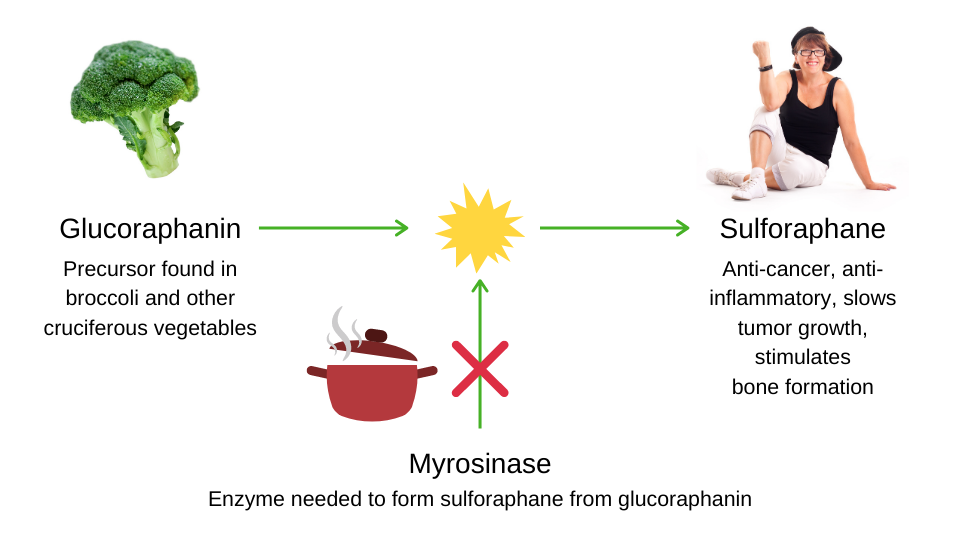Unfortunately, one of the most common side effects of many of the treatment protocols for breast cancer is bone loss. Surgery, hormone therapy, and chemotherapy can all negatively impact our bone health and lead to osteoporosis.
Nutrition and exercise are certainly 2 ways women thriving through breast cancer can protect their bones. One of the best foods for supporting both your bones and your breasts is broccoli.
There are numerous journal publications showing a diet rich in broccoli and other cruciferous vegetables are not only cancer-protective but can also support the body while undergoing cancer treatments. In fact, a large study involving nearly 5000 Chinese breast cancer survivors found that those women who ate approximately 1 cup of chopped cruciferous vegetables a day were 42% less likely to have died from breast cancer. These women were also less likely to have their cancer come back.
Broccoli serves up plenty of bone-building nutrients as well. It is a good source of calcium, magnesium, folate, vitamin B6, and vitamin K — a nutrient that is essential for the formation of osteocalcin (a type of protein found only in the bone).
But more important than any of these vitamins and minerals, Broccoli is a rich source of a compound called sulforaphane. Sulforaphane is a powerful phytochemical that appears to neutralize toxins, reduce inflammation, protect your DNA, possibly slow tumor growth, reduce bone resorption, and promote bone formation. Broccoli is not only a superfood for preventing cancer and osteoporosis, but also for protecting against bone loss while thriving through cancer treatments.
However, as with most plant foods, cooking compromises nutrients, including the concentration of sulforaphane in broccoli. So if you enjoy munching on raw broccoli, chew on! But if you prefer your broccoli boiled, microwaved, or steamed until soft, you are probably not getting the full benefits of sulforaphane.
The reason being is that to activate the sulforaphane in broccoli, we need a critical enzyme called myrosinase. Myrosinase converts the precursor glucoraphanin to sulforaphane. However, myrosinase is destroyed in the cooking process. No enzyme, no sulforaphane.
Fortunately, there are some things you can do to boost the formation of sulforaphane:
- Chop it up – When broccoli is chopped, glucosinolates and myrosinase are brought together and sulforaphane is more readily formed.
- Let it sit – Exposing broccoli to the air for at least 40 minutes (90 minutes even better) allows the activation of myrosinase, the enzyme needed to produce sulforaphane. Once sulforaphane has been formed, it won’t be affected by cooking.
- Steam it – Steaming broccoli for up to 5 minutes is the best way to retain myrosinase. Boiling or microwaving, even for as little as 1 minute, can destroy the majority of the enzyme.
- Add mustard seeds – Adding powdered mustard seeds to cooked broccoli can significantly increase the formation of sulforaphane. Mustard seed contains a particularly resilient form of myrosinase. Horseradish and arugula also contain myrosinase. Click here for a wonderful mustard seed vinaigrette to dress up your broccoli.
- Eat broccoli sprouts! – Broccoli sprouts are actually the best source of sulforaphane. In fact, compared to mature broccoli they contain 100x’s more sulforaphane. Garnish any dish with broccoli sprouts or add it to your smoothies, salads, or sandwich.
Whether you are undergoing breast cancer treatments, striving to keep your bones strong, or just trying to stay healthy and fit, be sure to get your daily dose of broccoli.

Susan Brady
is a Physical Therapist,
Nutrition Consultant and
Doctor of Integrative Medicine.
She has been treating women with osteoporosis for over 30 years and is dedicated to helping people achieve
lasting good health and vitality.
Want to learn more about how you can improve your bone health? Contact me for a free 15 minute phone consult to learn more about the BONES Method™ and how it can help you achieve strong, healthy bones for life!







